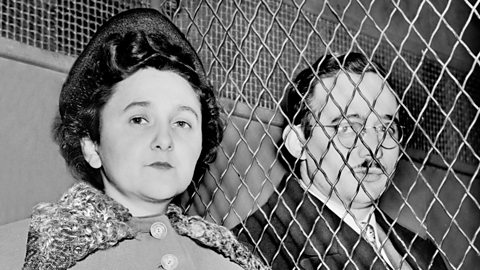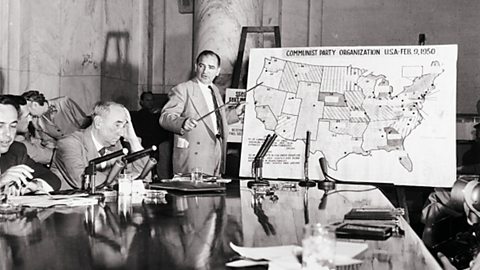McCarthyism
America had experienced what was called the Red Scare in the 1920s. The fear of communism An economic system in which all means of production such as tools, factories and raw materials, are owned by the community as a whole. Each individual contributes according to their ability and receives according to their needs. This means there is no hierarchy of social class. again came to the forefront of US politics and society after World War Two. Communism was seen as the opposite of Americaās values of capitalismAn economic system based on privately owned, as opposed to state-controlled, businesses and the creation of profit. and democracy. The communist states that developed in this period were run by dictatorA ruler with complete power. and their economies were directed by their governments to create classless societies. Many Americans feared that communism was a threat to their way of life.
In this context, Senator Joseph McCarthy led a ruthless anti-communist campaign against suspected communists in America.
A second Red Scare
The conflicting ideologyA set of ideas or thoughts that someone, or a group of people, believe in. The plural of this is 'ideologies'. of the Soviet UnionThe group of 15 communist republics formed from the Russian Empire after the revolution of 1917. (communist) and the USA (capitalist) eventually saw their wartime alliance develop into theCold WarThe political tension and competition for power that existed between the communist East and the democratic West after World War Two. The two sides did not ever go to war. The 1947 Truman Doctrine pledged that US foreign policy would be committed to containmentAn American policy to try and stop communism from spreading, to restrict it from spreading to other countries. stopping the spread of communism around the world. Then, in October 1949, civil war in China came to an end when its leader, Chairman Mao Zedong, announced the founding of the Peopleās Republic of China. The country became a communist nation. In the same year, the Soviet Union began testing its own nuclear weapons.
These international developments added to the increasing concern that communists were infitrationSecretly gaining access to an organisation to get information or influence the organisation with certain ideas. America - and, even more alarmingly, that government agencies were key targets. In March 1947, the government of President Harry S Truman introduced a new loyalty programme and security checks within the federalPart of the government of the USA as a whole rather than relating to an individual state. government. These meant that even a "sympathetic association" with an un-American organisation could lead to someone losing their job. No communist spies were uncovered, but hundreds of federal government workers were fired for being deemed 'security risks'. Critics saw this as an infringement of civil liberties, whereas defenders said these measures were important to protect Americaās security.
The House Un-American Activities Committee (HUAC)

The House Un-American Activities Committee HUACHouse Un-American Activities Committee investigated individuals suspected of communist beliefs or ties in America from 1938 onwards. Led by Senator Joseph McCarthy in the 1950s. was set up in 1938. However, after World War Two, it was tasked with uncovering and identifying communist threats in the USA. The HUAC became notorious for bullying and pressurising witnesses to produce names and information on communists or communist sympathisers.
Alger Hiss, a former US State Department official, was exposed as a Soviet spy by Whittaker Chambers, a self-confessed former communist. Hiss was convicted and imprisoned in 1950. Ethel and Julius Rosenberg were also accused of spying and were executed in 1953.
The rise of McCarthy
With paranoidBelieving, unreasonably, that people are against you in some way. growing, Republican PartyOne of the two major American political parties. Republicans tend to hold a more conservative viewpoint on politics and society. senator Joseph McCarthy, from Wisconsin, became a key figure in the anti-communist campaign. During a speech in February 1950, he claimed that he had a list of over 200 "known communists" operating in the US State Department.
McCarthyās methods of finding communist spies were often seen as immoral and undemocratic. He publicly accused influential people of being communists or communist sympathisers with little or no evidence. He aggressively tried to intimidate those he accused by attacking their personal character and questioned their loyalty to America.
However, these tactics gave him power, publicity and popularity. People who spoke out against him ran the risk of being accused of being communists and blacklistedWhen a person is prevented from working in a particular industry or faces restrictions that exclude them from society for political reasons. Even Dwight D Eisenhower, who became president in 1953, was reluctant to directly criticise McCarthy.
This communist witch hunt therefore became known as āM³¦°ä²¹°ł³Ł³ó²ā¾±²õ³¾ā. The term also refers to outlandish, sensationalist, unproven accusations of communist sympathy and connections.

The fall of McCarthy
McCarthy's actions, which were seen by many people as reckless, were finally confronted when he boldly claimed the US army was "soft" on communism.
- As part of an extended congressional investigation in 1954, hearings into the army were televised.
- The broadcast of the hearings allowed the extent of McCarthy's accusations to be revealed to millions of Americans.
- Following the public reaction to McCarthy's statements and behaviour, the Sentate voted in a majority to censureTo formally express severe disapproval of someone or something. McCarthy.
- His influence declined rapidly until his death in May 1957.